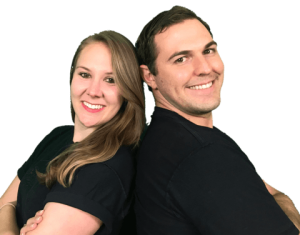Denis O’Brien [0:37]
Welcome to Episode 213. The importance of your savings rates. Hey money clan, a very warm welcome to the Chain of Wealth podcast. I’m your host, Denis O’Brien.
Katie Welsh [0:49]
And I’m Katie Welsh.
Denis O’Brien [0:50]
So Katie, today we’re diving all into your savings rate. And it’s a critically important number.
Katie Welsh [1:27]
You know, is a really important number Den, but at the same time, there’s so many different things that real life makes you juggle. It’s hard to prioritize your savings I think sometimes.
Denis O’Brien [1:12]
Kate, it’s 100% agree. And, you know, I think what’s really important as well as not just focusing on your rate, like this month, it’s focusing on your long term savings. And that’s really what’s going to be achievable and what’s going to help you built up money for when you want to retire one day.
Katie Welsh [1:27]
Yeah, for sure.
Denis O’Brien [1:29]
Yeah, so before we dive into today’s show, we’d love you guys or to let us know what your savings rate is on Instagram. Hit us up, it’s @chainofwealth on Instagram, let us know. And we would love to know what you guys are up to. Alright Kate you ready to dive on in?
Katie Welsh [1:46]
Yeah,
Denis O’Brien [1:46]
Fantastic. Let’s do it.
Voice Over [1:49]
Welcome to Chain of Wealth. Here’s your host, Denis inspiring you to begin your journey of financial freedom.
Denis O’Brien [2:2]
Alright Kate, so the savings rate. And this number, as we said earlier, is really, really important. And that’s for a number of reasons.
Okay,
Katie Welsh [2:10]
Yeah, it is. So but before we dive into that, I want to take a couple of steps back Den because life, unfortunately, for most of us is not just a cut and dry. Do this. Now you’re going to simply do this and it’s always going to be an easy pivot and a quick transition, and everything is smooth sailing that, unfortunately, is not super realistic. So what are some things that I want to talk about some things that you might have to also be juggling while you’re also having to save.
So first and foremost when you’re trying to save, and this is the conundrum that I felt often was pay off my debt or save when I would get you know, a little extra something over here on the side or a birthday gift or, you know, you get like a good scratch off lottery ticket and you win like 50 bucks. So what do you do with that money? And that’s my conundrum. That’s my new word of the day. If you haven’t noticed conundrum, what do you do in that situation when you are trying to save but also trying to pay off debt?
Denis O’Brien [3:29]
Well, Kate, like, I believe that you need to really figure out what’s important to you long term. Like maybe carrying a little bit of debt is okay with you, and if so that’s fine. But you also have to understand that there is a cost when it comes to debt. And like we said in episodes before, not all debt is bad debt a very often more most people need debt and, you know, like, isn’t something that just magically appeared now today, it’s something that’s been around for hundreds, literally thousands of years. And that’s this idea of, I don’t have money right now to pay for this big expensive thing. But a repayment plan you can suddenly make it affordable, but there’s a cost to not having that money.
Katie Welsh [4:9]
Right. Well, and I guess now that I’m sitting here thinking about it, it’s also is that money that you’re saving for like your emergency fund in case you lose your job or you get sick or maybe you don’t even have enough money for your if you have a car accident
Denis O’Brien [4:27]
Right.
Katie Welsh [4:27]
Suddenly, one morning I think prioritizing which kind of money you’re saving is also super important.
Denis O’Brien [4:36]
Yeah, I totally agree. So talking about savings rate. There’s many ways that you can sort of make it work. And I think one of the more common ones is, you know, you just say that’s my 401k match, you know, and whatever I’m going to be putting into my 401k is my savings. And we’ve spoken in other episodes as well how that in this day and age is simply not sufficient. You know, you need to be thinking about other ways to invest and other alternative assets to invest in as well. And, in fact, the sponsor of the podcast this month has been doing a lot of alternative investments in Fine Art and we’ll speak about them a bit later. But looking at other asset classes, and what else can you invest in is really important, your 401k you shouldn’t have all your eggs in one basket. And there’s a couple of ways to mitigate that risk of having everything all together. Other than investing in a wide variety of asset classes. What you can also do is, you know, really just try and figure out what things are important to you, and what do you want to save and invest in.
Katie Welsh [5:40]
Yeah. And I think it goes along with where you are in your life. What season are you in? Are you just starting out of college? Are you young? Maybe you’re just getting married, buying a home starting a family, or have you progressed a little bit because as your life changes, your savings is going to change as well.
Denis O’Brien [6:3]
Yeah. And, you know Kate, I just want to also just point out that a lot of people that are on the financial independence retire early path, they get really high savings rates, and that’s how they’re able to retire early. They focus on living on very, very low means and living on bare basics, almost bare bones, so to speak, living well below their means. And that’s really how they’re able to save a substantial amount of money and You know, like, well that is impossible for everyone. It’s actually crazy how possible it actually is if you try, like, if I were to say to you three years ago, we’re going to be hitting the current savings rate that you and I are achieving, you know, it would have been unbelievable for either of us at that point. But the thing is, like, three years ago, we were in a very different boat.
Katie Welsh [6:51]
We were completely different people too.
Denis O’Brien [6:53]
Yeah, and we’re paying off a ton of debt. And there’s this opportunity cost of the time, we were paying off debt as well, where we weren’t saving what we should have been saving for retirement. And
Katie Welsh [7:3]
I remember it used to keep you up at night, actually.
Denis O’Brien [7:5]
Yeah it did. Like, I felt like we weren’t putting enough money away. And you know, we have a lot of live expenses coming up, like getting married and all sorts of stuff. And you can’t look at such things as you know, expenses, but that’s what they are. They’re eating directly into your future retirement income. So you really need to figure out what’s important so chatting about retirement rates and stuff, I would sort of say that if you’re able to sort of save at least 10% of your take home pay, you’re not in a bad position.
Katie Welsh [7:36]
So I want to piggyback on that. And also set goals for yourself. I am a really big goal setter, maker, goal set maker. I do in my classroom, I do it on all areas of my life. And we have a recent goal that we’re working towards. And the goal that we’re working towards is being able to have enough money for a down payment on the home at 20%.
Denis O’Brien [8:8]
Correct. Yeah.
Katie Welsh [8:9]
Because we want to try to be smart. We don’t want to pay that PMI. So a 20% down payment on a home. And we’ve decided that you know, at a certain increment each like rung that we hit, we’re going to treat ourselves a little bit because we don’t because we are saving, and really working towards this goal, we don’t do some of the things that we like to do. As often
Denis O’Brien [8:37]
Right, you have to sacrifice to really make it worthwhile.
Katie Welsh [9:9]
Right? So we eat a lot, a lot of meals at home. We do a lot of cooking a lot of grocery shopping. We do love eating. But we now take a lot of that food time that we used to go out, and now we cook it at home. And we’ve agreed that, you know, for each little interval that we strive to get to, we’re going to treat ourselves for a nice dinner out somewhere,
Denis O’Brien [9:9]
Right. Yeah.
Katie Welsh [9:10]
So I think and that is
Denis O’Brien [9:41]
Celebrating small little wins.
Katie Welsh [9:13]
Yeah, the celebrating of little goals will keep us excited to keep going motivated. And then we can, you know, kind of sit and look at how far we have come not just how far we still have to go. And I think that is important with just anything, even if you are paying off debt, don’t look at how much more you still have to pay off all the time. Also, look at how much you paid off, because that’s also important.
Denis O’Brien [9:41]
Yeah. Kate, that is really important. And, you know, like, I just want to create something that’s a little bit early, as I said, like about a 10% savings rate. That’s what I made for like your take home pay after you’ve already done your 401k like contributions and stuff like that. So and really, you should be trying to max out your 401k so it’s actually a lot more than what I originally said it was if you take all things into account really
Katie Welsh [10:4]
Right.
Denis O’Brien [10:4]
So I mean, like just to give you guys an idea of now that Kate and I are debt free. And obviously we don’t have any kids or anything like that. We’re saving just shy of about 50 50% of our income, and between our 401k and just general saving for a house at the moment. And, you know, like well that’s not us like gloating and being Oh, we’re saving so much money, you know,
Katie Welsh [10:25]
It is a lot of work.
Denis O’Brien [10:26]
It’s really tough to put away so much money like we work really, really hard. We work multiple jobs each and doing that enables us to save money. And, you know, just on that topic of working multiple jobs, if you are working multiple jobs, you’re able to put away so much more that the power of those extra income slices are huge, like, just between Kate’s side hustle job that she goes and she tutors someone. She’s bringing home an additional 15% of our savings money, which is massive. If you think about it, like we get a free 15% return. Like just you know, every month that’s phenomenal.
Katie Welsh [11:4]
Well and just on that if my voice is a little hoarse today it is because I’m coming from that tutoring job.
Denis O’Brien [11:11]
Right but we are recording at like 7 o’clock at night.
Katie Welsh [11:13]
Is it only seven o’clock?
Denis O’Brien [11:15]
No, it’s a bit later than that now.
Katie Welsh [11:16]
I was just gonna say I feel like it’s midnight. But it has been a very long day. You know, starting teaching at seven you don’t get home until 7:30 8 o’clock at night. It is a long day. So my apologies if my voice is a little crackly.
Denis O’Brien [11:34]
Well. Just on that note. Now it’d be a great time to say a very big thanks to our sponsor, and we can discuss how you can improve your savings rate when we get back. Masterworks is our sponsor today, and they help you invest in the art market, which was previously only available to the uber wealthy.
Katie Welsh [11:54]
I love this because now people who are really into art and even people who aren’t into art can learn a lot about it and invest in it with a minimal money Den because you only need $1,000 to start your account. And that buys you 500 shares worth of Pablo Picasso paintings or a Monet painting or any because they have a whole bunch of different paintings and painters that you can choose from.
Denis O’Brien [12:24]
Yeah, Kate, it’s I’m on their website right now and I’m looking at this one piece and it’s returned over 145 x over the past 46 years which is a fantastic investment. Yeah, so if you’d like to check it out, head on over to chainofwealth.com/art that’s ART. chainofwealth.com/art you can bypass the wait list of over 17,000 people and start investing today with Masterworks. Alright Kate, so chatting about ways we can improve our savings, rate. So I know we said a little bit before the break that’s having these additional income streams, you know, work through side hustles is a great way. What other ways can people try and improve that savings rate?
Katie Welsh [13:11]
The first thing that comes to my mind is anything that you are going to spend your money on, that is rather out of the ordinary something. And I mean, something like that you don’t typically buy like say, you know, you need new tires for your car. I don’t know why car analogies.
Denis O’Brien [13:33]
I think you have a fear of like paying off for a car tire.
Katie Welsh [13:35]
I do. I do have a fear of like big car expenses. But anyway, so new tires for your car or you know even something a little bit more simple and enjoyable, new shoes I just had to buy new sneakers. And the only reason and I turned to this over in my head Den for a long time and the reason I ended up getting new sneakers because from the looks of them, they were completely fine. And for anybody who really knows me, I wear my sneakers until they have like a hole in them. And that’s why I got the sneakers that I just replaced because my favorite shoes had a hole in the side and I was embarrassed to wear them to work.
Denis O’Brien [13:36]
Right.
Katie Welsh [13:42]
Anyway, the new sneakers that I got were awful. And I say that by like not even a vanity fact, they killed my feet.
Denis O’Brien [14:38]
Yeah, you had like bruises on your feet
Katie Welsh [14:40]
There or more than one time that I would wear my sneakers to go out walking around DC or when we were hiking in South Africa or we went on a quick little mini trip to Chicago. And by the end of our trip in Chicago, I was limping through the airport. I was miserable and it when your feet hurt, like nothing is fun. And then the final straw, the straw that broke the camel’s back, was I am trying so hard to be a better runner. Like I hate running. So I’ve made many goals for myself to run three times a week for 10 minutes at a time, which I in the first submit not a lot, but it’s a lot for me. And after my first week, my toes hurt so badly after running in those sneakers. And then when I actually looked at my toes without nail polish on my I had bruises underneath my toenail and I was like, alright, that’s, that’s like the final straw. I’ve got to go get new shoes. And I did buy, you know, nice sneakers that were on sale, but I really turned it that over in my head, I did not really want to spend the money as much as my feet had hurt. So I guess that’s a really long winded answer to your question of what else can people do? And I think it’s really just be mindful of what you are buying and if you are really trying hard to reach a specific goal. Make sure that it is a need and not a want.
Denis O’Brien [16:19]
Yeah, I totally agree. And you know, Kate, something else people can do is look for additional ways to earn passive income. And I know we’ve covered passive income quite a bit infact.
Katie Welsh [16:29]
And its everybody’s dream.
Denis O’Brien [16:30]
We wrote quite a long post about it. It’s currently like bottom of page one on Google for passive income or top of page two somewhere around there. If you guys want to check it out chainofwealth.com/passive-income. But we did a real deep dive in terms of the importance of setting up these income streams and some ideas in terms of what you could maybe set up. You know, as an example, I know, we spoke about how some people make money blogging on the internet. And although it’s quite a hard way to make money initially, it takes a lot of upfront work. If you set it up, you can earn hundreds to thousands of dollars extra every month. And so setting up these sort of like micro businesses could be a great way to improve your savings rate. Because now it’s like I said earlier, if you have a side hustle it’s that extra money coming in, and, you know, so really getting your income higher than ordinarily would be and really trying to manage your expenses as well. I know we said you know, it’s really think about those one off purchases that you’re making, but also just look around your life. And, you know, one of the big things that I see a lot of people dealing with is subscriptions. You know, people love their subscriptions. These days, we live in a software as a service or some subscription model environments. You know, everything’s got a subscription these days. And you if you go on Amazon, you want to buy like, I don’t know, some, let’s say deodorants. It asks you if you want to buy a subscription to deodorants, it’s the crazy thing.
Katie Welsh [17:56]
Is it really?
Denis O’Brien [17:57]
Well, yeah, maybe not deodorant exactly. But a lot of the times you go on there, and it’s like, oh, do you want a subscription will give you a cheaper price because they know the power of that recurring revenue for themselves that they’d rather take a giving you a better price, then, you know, lose, you will not have you buy again. So look at what subscriptions you have. And the big culprits that I can think of is your cell phone bill, your insurance, you know, like, are you really paying the best rate? Maybe you should double check what plan you’re on do you really need the $90 cell phone plan? Really? You know, how much is that data really giving you? Yeah, yeah, you may have great roaming whenever you go overseas, but how often do you go overseas? You know,
Katie Welsh [18:41]
and is it just you on your plan? Or do you have a whole family going?
Denis O’Brien [18:45]
Exactly. So looking at your life and sort of trying to optimize it in such a way that expenses are minimized, and I’ll give you a quick example, our renter’s insurance that we have. So we went with the renter’s insurance that are building recommended, and it was like 22 bucks a month. And you know, you don’t think much of it you check, okay alright 22 bucks a month, that sounds above right for what it should be. And, you know, we probably paid that for about a year. And then I contacted our insurance agent that we had our car through and I said, well, what happens if I took renters insurance from you guys, and they’re like, Oh, well, we’ll bundle the products and it will only be 10 bucks a month. So we switched and just that change in itself to save us $120 a year. And while $120 doesn’t sound like a lot of money, If you do that with a lot of things, and over a long period of time, it’s a huge amount of money.
Katie Welsh [19:36]
You know, you’re definitely right. Also, I’ve noticed that whenever, if you have cable or your internet bill, a lot of times they like to just sneak that up without mentioning it to you.
Denis O’Brien [19:47]
Yeah they offer. They often offer like a discount or for the first year, but the moment the second year hits you hit with more.
Katie Welsh [19:53]
So yeah, and if you call and you, you ask, they will drop it.
Denis O’Brien [19:58]
Yeah, so definitely way up your options and just check those subscriptions. So yeah, today was the importance of your savings rate. Definitely try and get it as high as you can, and focus on the long term when it comes to your savings. It’s really what’s going to set you guys up for success. And once again, we’d love to know what your current savings rate is hit us up on Instagram. It’s @chainofwealth on Instagram. We’ll catch you next time on another episode of Chain of Wealth.








